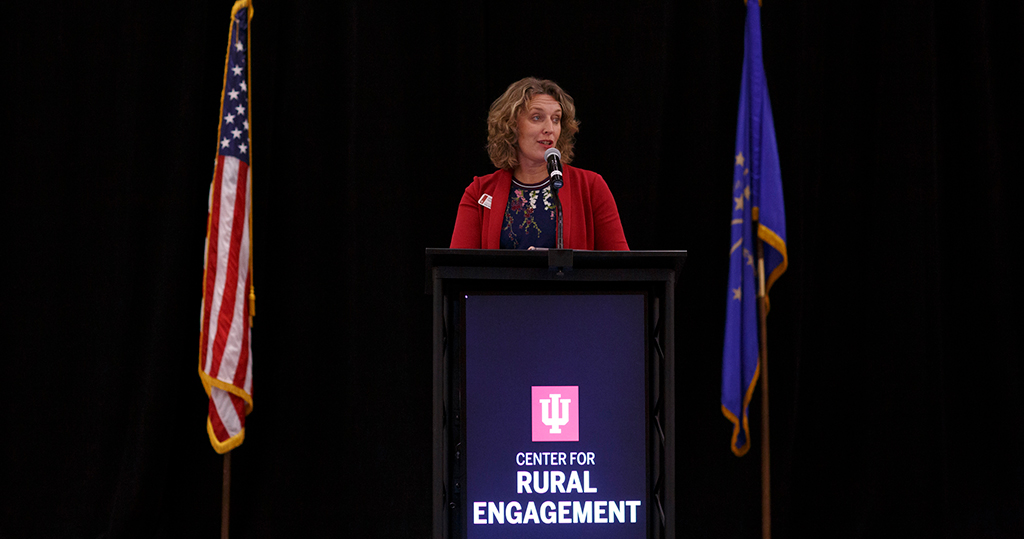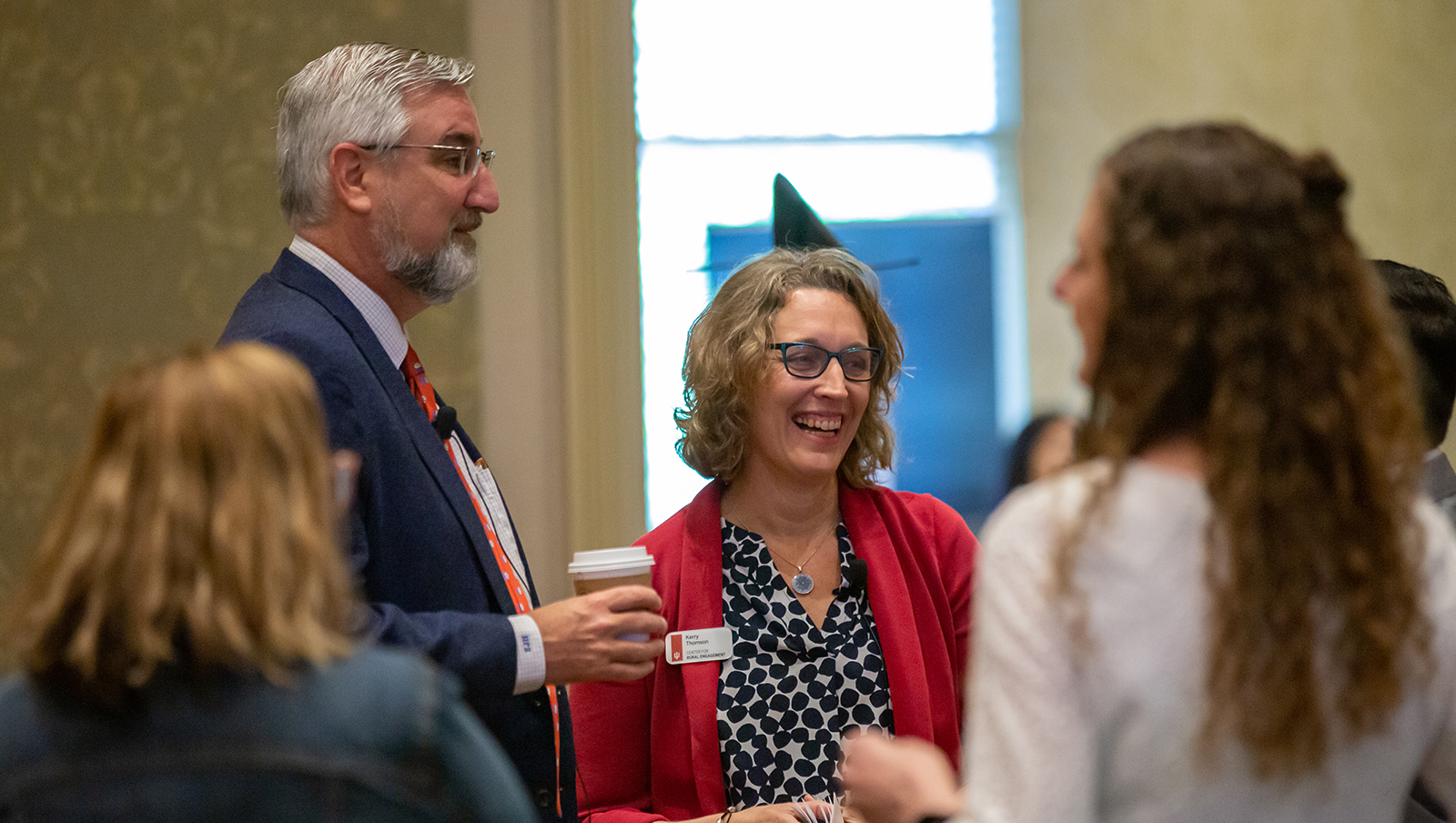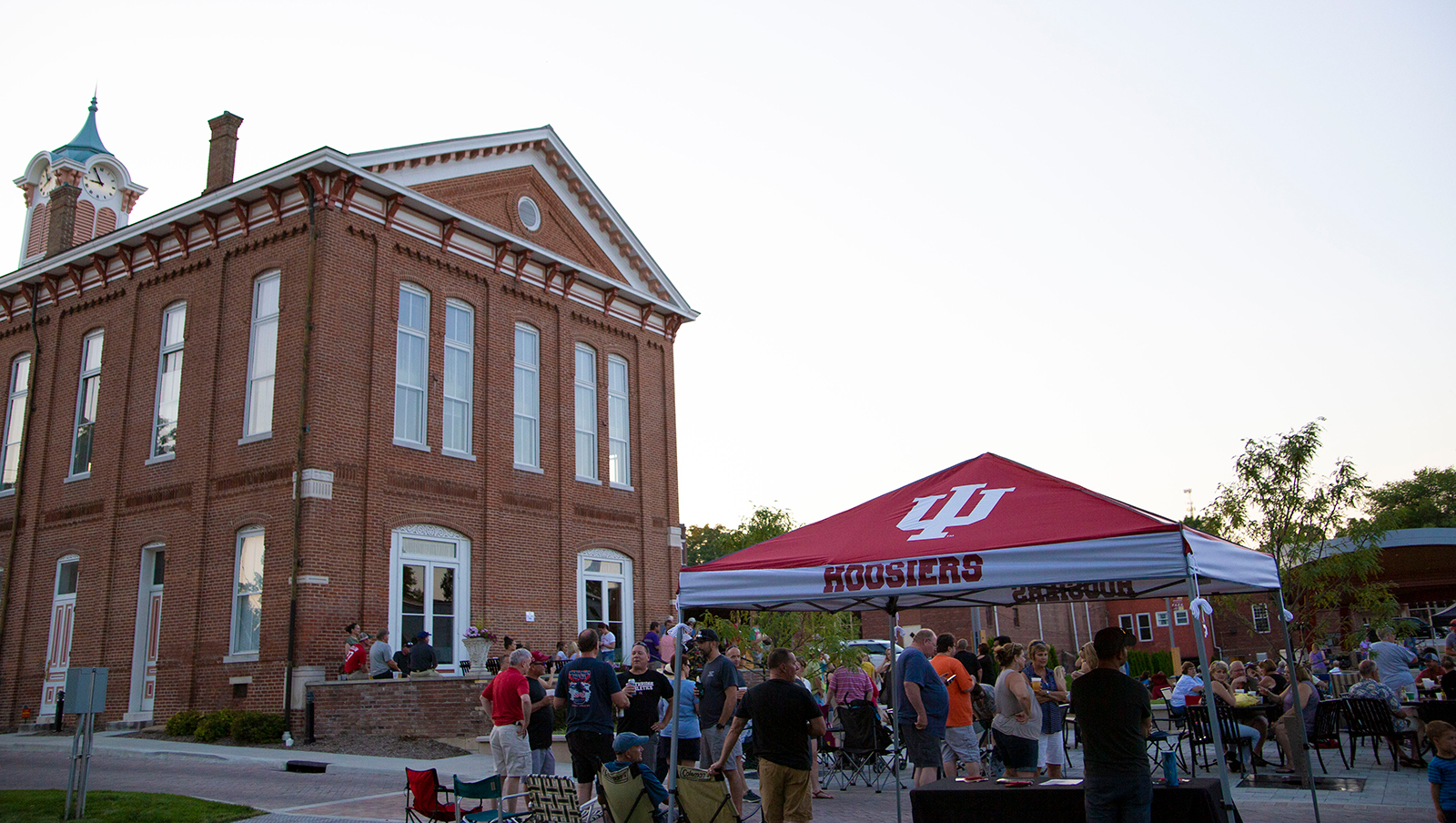
Interview: Kerry Thomson from the Indiana University Bloomington Center for Rural Engagement
As a longtime resident of Bloomington, Indiana, Kerry Thomson has learned a thing or two about what it means to be a part of a community. In her previous position as director of the Center for Rural Engagement (CRE) at Indiana University Bloomington, Thomson helped rural communities in Indiana collaboratively address challenges they face, and make the most of opportunities they encounter.
One such opportunity has turned out to be helping small rural communities prepare for the April 8, 2024, eclipse. In anticipation of the day, the CRE created a microgrant program that helps 30 organizations throughout rural Indiana prepare logistically and creatively for the upcoming astronomical event. The microgrants will help each organization develop activities around the eclipse that bring their communities together, while also helping provide resources they need to host safe viewing events.
Recently, Thomson has started in an exciting new role as mayor of Bloomington, where she plans to make the most of what she’s learned from the CRE and the rural communities with whom she has worked. Her life has certainly gotten busier, but she remains excited about helping prepare Bloomington and other rural communities for the eclipse.
We recently spoke with Thompson about her time at CRE, and about her then-upcoming role as mayor. This interview took place prior to Thompson’s swearing in on January 1st, 2024.
This transcript has been edited for clarity and brevity.
Tell us a bit about yourself.
I’ve been a community leader for my whole professional career. I led Habitat for Humanity here in Bloomington, Indiana, for 20 years, and before that, I was doing special projects around the country with Habitat. I direct the Center for Rural Engagement (CRE) at Indiana University Bloomington, where the focus is to partner with rural communities to achieve their visions of being a thriving 21st-century rural community by using the research service and engaged teaching of IU Bloomington to help them do that. In my upcoming life, I’ll be mayor of Bloomington.
What is your favorite memory of the sun?
When I was in the fifth grade, we had a solar eclipse pass over my school right outside of Washington, D.C., where I grew up. We weren’t allowed to go outside for the eclipse, but we stood at the window with these pinhole cameras that we’d made to see it. I remember just being in this mass of bodies, all lined up tight against the window.
What has your relationship been to science throughout your life? How did it lead you to where you are now?
I’ve been mostly a social scientist throughout my life. I loved biology and genetics in high school, but then I really leaned into math in college, and had this wacky degree in math and social sciences. In my later years, I ended up marrying a physicist and so I say that he believes that anything is possible in the physical realm, and I believe anything’s possible in the social realm. We have lots of discussions about science and life. That’s why this eclipse work is so incredible, because it’s focused on arts and culture as it relates to the eclipse. I think so many of us put science in a box, but really, science is every day. Especially being married to a physicist, I understand how much I use science in my daily life, so I guess I’m much more of a practitioner of science, rather than a scientist myself.
How did your passion for community building start, and how did that lead you to the Center for Rural Engagement?
My passion for community building started at a really young age. I went to a summer camp, and our whole goal at summer camp was to create a community where everybody was welcomed and appreciated for the gifts they bring. I’ve sort of taken that into the rest of my life, and really looked at ways to create solutions in community — where we can create a system that acknowledges that we all have gifts and needs and that if we come together as a community on any given problem, we probably will have enough assets to solve whatever we’re trying to solve, together.
The CRE really takes this premise and applies it to our asset-based model. We take communities that are rural, and we recognize that they already have an incredible amount of assets there that they may not be able to enumerate on a daily basis to tell their story. The CRE comes in to partner with them and help them look at their assets. We also see if they want student help or faculty help to look at a research question or to put together a strategic plan for something, recognizing that the university is getting something out of that as well. That model is very different, I think, from a lot of university interactions with communities where communities can be left feeling sort of like a guinea pig in an experiment or as less than. At the center, we really work in partnership with people and with communities.

What is the center doing to commemorate the 2024 total eclipse?
We established a microgrant program that would go to 30 rural organizations across Indiana to host arts and cultural events connected to the eclipse and had an overwhelmingly positive response. We’re going to have a fun party at an art gallery to kick the program off, and then we’ll have regular touchpoints with them, leading up to the eclipse, on developing safe viewing events.
The center is also playing a role in the university planning for the eclipse, because many people will be coming to the university on that day. In a regional way, we’re trying to encourage and facilitate discussion and planning for the eclipse. What’s pretty incredible is that the eclipse and our programming around it has gotten so much traction on our social media, much more than anything else we’ve ever done. People are just fired up, and it’s been a way that the center can really take a leadership role in getting all of the communities around us that are in the path of totality excited about what’s coming, because it’s a real opportunity for them. It allows the communities to do what they’re already rehearsing doing, which is a whole-cloth community approach. The economic development folks are really interested, and the tourism folks are really interested, but we also have the arts leaders who are saying, “Oh, yeah, the eclipse could really be a time when people want to do something creative.” The eclipse breaks out from being just about science on this one day.
Can you provide examples of what CRE is providing to the community?
We are part of a wider team now that includes community leaders, tourism leaders and university partners who are meeting to do the preparation and the best-practices work for the big day. And at the university, even outside of the center, we have experts who are familiar with doing mass crowd control and safety preparations, and so we are putting together best practices for those.
Our facilitation more on the ground with people who are doing the tourism piece of this is: “How do you start to build the buzz in the community for what’s happening so that we can be really welcoming to those who are traveling from afar? And how do we help tell our community stories while they’re here?” Because it is a little bit surprising that Paoli, Indiana, is going to have perhaps 200,000 more people in it. I’m sure some of those folks who are going to land in Paoli may have never heard of it before.
Jumping now to your upcoming role, what’s exciting for you about the eclipse work you’ve done at the CRE and your tenure as mayor of Bloomington?
My time at CRE is eclipsing now, but it’s exciting for me to move into the mayor’s office, partially because I’ve learned so much from the different communities that we’ve been working in. I think it may be unexpected for people to hear that Bloomington is the big city here, so I’ll be the mayor of the largest city in the region that CRE has been most focused on, and I’ll be taking the lessons that I learned from those communities into the mayor’s office.
I’m also really excited that some of those partners CRE has engaged will remain partners. I think we talk a lot about regionalism throughout the world, and our connection to those in our general area. But then we get to work, and we just do our thing. A county line can be as profound and as much of a barrier as the line of a country sometimes, so I think that when we look at regionalism as something that enhances each of our communities, and where we don’t have to have all of the resources in every community, we can really bring them together and enhance them where they are. That’s really exciting to me, because I think Bloomington in particular has been kind of seen as the sort of big dog that may not want to play with the others as much. I very much do. I think that we have a lot to offer each other.

What are you bringing with you to your mayoral role from your time at the center?
Specific to the eclipse, I am interested in all of the nontraditional science engagements people can do with the eclipse, and really embracing this as a community even. I’ve been reading about the eclipse, and they used to be really spiritual times for people, or community gathering times, and I am a leader who’s always on the lookout for things that bring us together, where it doesn’t matter who we are. We’re all having this shared experience. And what more significant experience than an eclipse could possibly illustrate that? So, I’m really excited about it, and I’m thrilled that I’ll be in office and helping to lead our community when it happens.
What are you looking forward to in the months leading up to April 8?
I’m excited about building a great and very inclusive party. We’re all really looking forward to it. I think that it’s really an opportunity for us to come together as a community, just to do something that is a physical experience of something completely outside of ourselves that really, in ways that perhaps nothing else can, unites us as people. With everything that’s going on in the world, especially right now, we need to recognize that we all have a human experience when we look at something as wondrous as an eclipse. For us to provide some time for reflection and some messaging behind that, I think, is a really exciting opportunity.
What will your day look like on the day of the eclipse?
I have no idea. I don’t have a mayor’s calendar yet, so it’s an odd time for me to be transitioning. But I imagine we’ll have people in town who are excited about the eclipse, and I am hoping to do eclipse-related activities all day. I’m also part of a creative writing group in town, and we might host some things. Our local children’s science center, WonderLab, is hosting some activities, and then the university is doing quite a bit on the actual eclipse day. We’re also, of course, planning things to keep people in town to avoid any traffic jams after the eclipse.
What are you looking forward to in the aftermath of the eclipse?
I think it’s a real opportunity for us to start conversations with new connections and explore what’s possible. I mentioned earlier in our conversation that I believe pretty much anything is possible in the social realm. This shared experience will allow us to be able to make connections that may not have emerged naturally otherwise. And so my plan would be to follow up on those conversations and see if there are other shared interests and projects that we want to work on together.
Do you have any advice for people who are organizing their communities for the eclipse?
I think my best advice is to get creative. There will be natural partners who come to the table who think they should be involved in an eclipse. But we’re able to do something that, frankly, every community could be doing, which is looking for partners who you might not have thought of. In your conversations about planning, listen to why people are excited about the eclipse and let that open your mind to who else could be at the table. The eclipse is a really, really tremendous opportunity for us to look at new ways of working with groups we don’t usually work with. I find that if we can find a little bit of common space with people, and with groups, usually that can lead to further partnerships down the road. So don’t let the opportunity pass you by. Invite people to the table. Sometimes they won’t come the first time. Keep asking.
Thanks for joining us, Kerry!
Thank you!